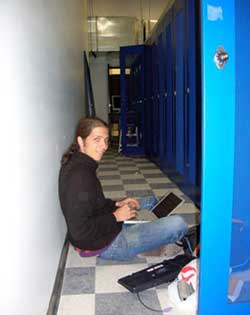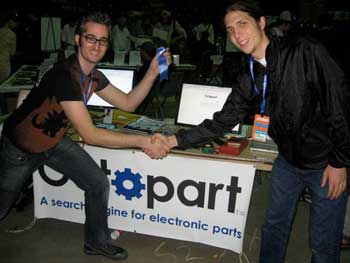Sam Wurzel

Wurzel does some last-minute coding at the data center housing the Octopart servers.
If you've ever searched for a microcontroller or a transistor online, you may have come across Octopart.com, a search engine for electronic parts co-founded by Sam Wurzel in 2006.
At the time, Wurzel was a graduate student at the University of Colorado in Boulder, studying plasma physics. On the side, he was also making small ventures into business—for example, he designed and built a battery-powered amplifier that allowed two people to listen to the same music player using headphones without sacrificing sound quality. "I think I sold about ten of those on eBay," Wurzel recalls.
A turning point occurred when Wurzel read the essay "How to Start a Startup" by Paul Graham, a prominent figure in the Silicon Valley startup scene. Around the same time, Wurzel got a call from his friend Andres Morey, also a physics graduate student, who was frustrated with looking for electronics parts in huge paper catalogs—an experience that was also familiar to Sam. Recognizing the need in the scientific community for a resource to help people find parts more easily, the two decided to start a search engine that would make the dreaded paper catalogs obsolete. Wurzel came up with the name Octopart because he liked the image of "an octopus reaching out with its tentacles and grabbing various parts from different sources."
"When we started working on Octopart, we would do research in the lab during the day and stay up until 3 or 4 a.m. coding for Octopart" says Wurzel, who left Colorado with a Master's in physics in 2006. By the end of the year, Wurzel and Morey had developed a rough prototype of the website, which was running on a server Wurzel had bought at a yard sale for $50; they had also raised some money from Graham's seed funding firm, Y Combinator.
Four years later, Octopart gets over 420,000 unique visitors per month, and has attracted a sizable customer base that includes science researchers, engineers for large companies, buyers for electronics manufacturers, and individuals working on small projects. While it may not have achieved the mass-market appeal of Google or Facebook, the site is now profitable, and Wurzel says the prospects for continued growth look good.

Wurzel accepts a prize on behalf of Octopart.
"Starting a company is similar to doing physics research - both have the potential for huge impacts on people's lives, both require problem solving and creative thinking, and both are filled with hidden traps and blind alleys. With startups though, there is more immediate contact with the outside world. If our website goes down, our users will let us know, while in the lab, if the apparatus breaks, you might not get any emails about it."
Despite his decision to leave the physics research track, Wurzel says his physics background helps him in his work at Octopart. "Studying physics prepared me extremely well for starting a company and building a product," he says. "When we started working on Octopart, none of us had done any real web programming, and we didn't know what a database was, but my experience working in an experimental physics lab provided me with a great foundation for jumping into technical fields I knew nothing about."
When he's not at work, Sam likes to read, fix bicycles, and keep up-to-date on what's happening in the physics world, especially in energy research. As for the future, he says, "There are lots of opportunities for startups in the renewable energy space, so maybe one day I'll get involved with that."











